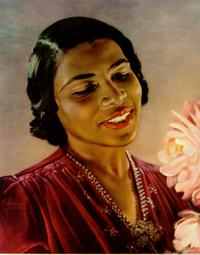A Life, The Music & The Legacy
|
The bequest of Marian Anderson has been an inspiration to many writers and artists all over the world. There were many classics created by famous producers to bring forth the clambered life of Marian Anderson. The year 1999 saw the first of such attempt entitled ”My Lord, What a Morning”, The Marian Anderson story, which was produced by Kennedy Center. In the year 2001, the documentary film ‘Marian Anderson: the Lincoln Memorial Concert’ which was created in 1939, was chosen by the Library of Congress for preservation in the United Sates National Film Registry as a “culturally, historically or aesthetically significant” work. This documentary also forms the plot of Richard Power’s novel ‘The Time of Our Singing’ (2003). In the year 2002, the great scholar Molefi Kete Asante included Marian Anderson on her list of 100 greatest African Americans. A commemorating U.S. postage stamp honored Marian Anderson as a part of the Black Heritage series on 27th January, 2005. Although she was often denied basic courtesies during her early years, she was inundated with awards and recognition in her later years. After being awarded the NAACP Spingard Medal in 1939, she given the United Nations Peace Prize in and the Congressional Gold Medal in 1977, the Kennedy Center Honors in 1978, the George Peabody Medal in 1984, the National Medal of Arts in 1986 and in 1991 and a Grammy Award for Lifetime Achievement. In 1980, the United States Treasury Department coined a half-ounce gold commemorative medal with her likeness, and she was the first recipient of the Eleanor Roosevelt Human Rights Award in 1984. In addition, she was awarded honorary doctoral degrees from Howard University, Temple University and Smith College. This adulation demonstrated the the world has finally recognized that she was a Great Black Heroine |
Timeline 1897: Marian Anderson was born 1909: Shifted base to South Philadelphia 1912: Graduated from Stanton Grammar School 1925: Performs with New York Philharmonic Orchestra 1928: Becomes first black female to perform at Carnegie Hall. 1935: Made her first recital appearance in New York at Town Hall 1939: Denied use of Constitutional Hall, Marian Anderson sings on steps of Lincoln Memorial 1943: Marries Orpheus H. Fisher 1955: Became first black singer to perform with Metropolitan Opera as regular company member 1957: Sang for President Dwight D. Eisenhower's inauguration and toured India and the Far East as a goodwill ambassadress 1961: Sang for President John F. Kennedy's inauguration 1962: Performed for President Kennedy and other dignitaries in the East Room of the White House. Also toured Australia 1965: Gave her final concert at Carnegie Hall |
